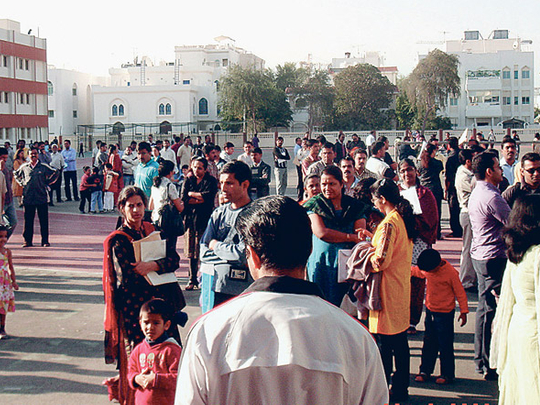
Abu Dhabi: Villa schools are no solution to the lack of seats at Indian curriculum schools, education officials have said.
The schools operating at residential premises pose serious health and safety risks for children, inspections by the Abu Dhabi Education Council (ADEC) have found. Hence, the council will not jeopardise the safety of students for the sake of solving the problem, officials said in a statement issued yesterday.
The statement comes as many Indian schools, educating hundreds of children, are currently being run in villas. These schools were served with a notice in 2008 to move out into purpose-built premises or face closure by 2013. In January, quoting this notice as the reason, a prominent school with 3,000 students announced their plans to close down by 2013.
Situation worsens
While demand for seats has outstripped availability even in past years, the announcement of the closure of Sherwood Academy and Merryland Kindergarten worsened the situation.
Increased applications were seen at other schools as a result.
The issue was first highlighted by Gulf News in January when over 2,500 pupils had applied for over 100 seats at the Abu Dhabi Indian School. The school resorted to a lottery system to decide who gained admission.
The closure announcement has also fuelled concerns over the continued running of other villa schools, which could potentially leave thousands of students without seats.
Currently, as many as 21,193 students study in the 17 Indian schools located at Abu Dhabi Island and in Mussafah and a large majority of these schools are in villas.
"ADEC announced in 2008 that villa schools would be phased out of the private education system. ADEC has conducted detailed inspections and found that a large majority of these schools pose serious health and safety risks. While we understand that parents are concerned about school placement, ADEC will not jeopardise the safety of students, and is actively looking at solutions to address the replacement of students," the statement reads.
The council is committed to ensuring that private education meets basic quality standards and provides a safe environment for all children, it said. In a bid to resolve the issue, ADEC is seeking to increase capacity by 11,000 seats. An empty government school in the Al Gharbia zone that could take up to 800 students has also been identified.
Free land on offer
The Abu Dhabi Education Council (ADEC) has decided to provide free land for school investors as an incentive to help resolve the acute shortage of seats at Indian curriculum schools.
"ADEC offers to provide free land for investors who present business plans to build schools that provide low-cost Indian curriculum education that comply with standards and guidelines," officials said yesterday.
"ADEC is extremely concerned about the current lack of capacity of Indian-curriculum schools and would like to assure the community that it is actively looking into both long- and short-term solutions for this issue. We need to work in partnership with the community to make this a reality," the council reiterated.
The council recently met with the Indian Ambassador to discuss this issue, and has encouraged Indian investors to be involved in this effort to find low-cost education solutions for their own community.
This capacity problem for Indian curriculum school placement originated because historically there have been few private school operators who apply to provide education that cater to lower-income families, ADEC said.












